The rickshaw debate
The evolution of our humble rickshaw to the battery-driven ones is as colourful as this old mode of transport.
However, this change is facing teething issues. For one, we do not like the honking horns, and the reckless speed. While a few of us might confess to loving the speed and riding on a battery-run rickshaw after 10:00pm for the heck of it; the consensus is that we do not want such rickshaws plying our residential areas or major avenues.
There is a certain kitsch kind of outlandish charm in Dhaka's rickshaw, to the point that rickshaw art is synonymous with Dhaka and its souvenirs. Hand-pulled rickshaw and Dhakaites have a long history of togetherness.
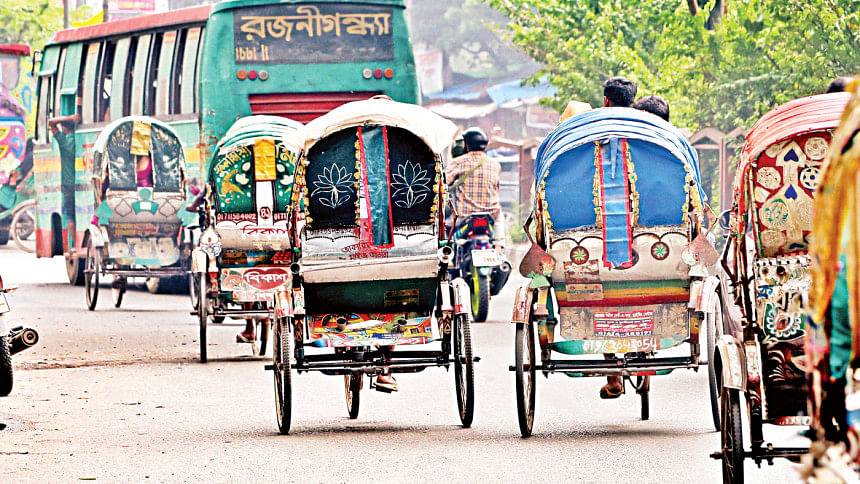
If we step back to the seventies or eighties Dhaka, when the city was a quieter and greener place, and when its people had no clue what being stuck in traffic chaos meant; this human-powered carriage was our only vehicle, especially for the toiling middle-class and commoners.
There is not a single person in Dhaka who can say that they have not had the pleasure of riding a rickshaw; for that matter no one in the entire span of Bangladesh.
Dhaka's rickshaw is more than just a mode of transportation; it is an iconic symbol of the city's vibrant, chaotic, and colourful essence. Winding through the bustling streets, the hand-pulled rickshaw has become deeply embedded in the fabric of Dhaka's identity, offering a unique glimpse into the city's rich cultural landscape. The rickshaw's bright, intricate artwork captures the creative spirit of Dhaka's residents.
It represents a quieter, slower-paced era of the city, harking back to times when life was less hurried and traffic congestion was more manageable. For many, the rickshaw embodies nostalgia for a Dhaka that once had more green spaces and quieter roads, a city that was more personal and intimate. Over the years, the rickshaw has withstood the test of time, making it not only a practical tool for getting around but also an enduring symbol of Dhaka's soul -- its resilience, its charm, and its complexity.
My love for this hand-pulled carriage started from an early age. My middle-class family's definition of weekend fun was a ride on a rickshaw, hired by the hour. I stood by my father, and my toddler brother on my mother's lap as we rode through green and serene Dhaka -- Hare Road, Bailey Road, the High Court area, the university campus, and the British Council on Fuller Road. We invariably took an ice cream break at Topkhana's Igloo Bar.
My parents enjoyed their romantic evening rides to my granny's or their friends, or to just stock up on their weekly groceries from the local bazar. Those were simpler times filled with simple pleasures of life.
I can share pages of nostalgic memories I have about my rickshaw rides, starting from going to school in our designated Abdul Bhai's tri-cycle, my first date, the rain-soaked trips to run errands, to hiring a fleet of rickshaws, and recklessly sitting on the open hood and singing our way to go to Swiss Bakery with our cousins, which was our only posh fast food joint at that time.
Abdul Bhai lived in our locality, and his self-righteousness earned him brownie points with my parents. He was sort of our taxi back at that time. He was assigned to drop and pick us up from school, and that was when I developed my fondness for rickshaw rides.
He raced with his fellow pullers, got us krishnochura branches standing on the seat of his tricycle, and showed off his antics of riding on just two wheels, and I grew a fondness for velocity and big thrills.
Having said so, I detest aggressive driving, harsh acceleration, sudden braking, hard cornering, and uncontrolled speed. And I find all these in our new "motorised nonsense" and it is a jarring experience for us passengers.
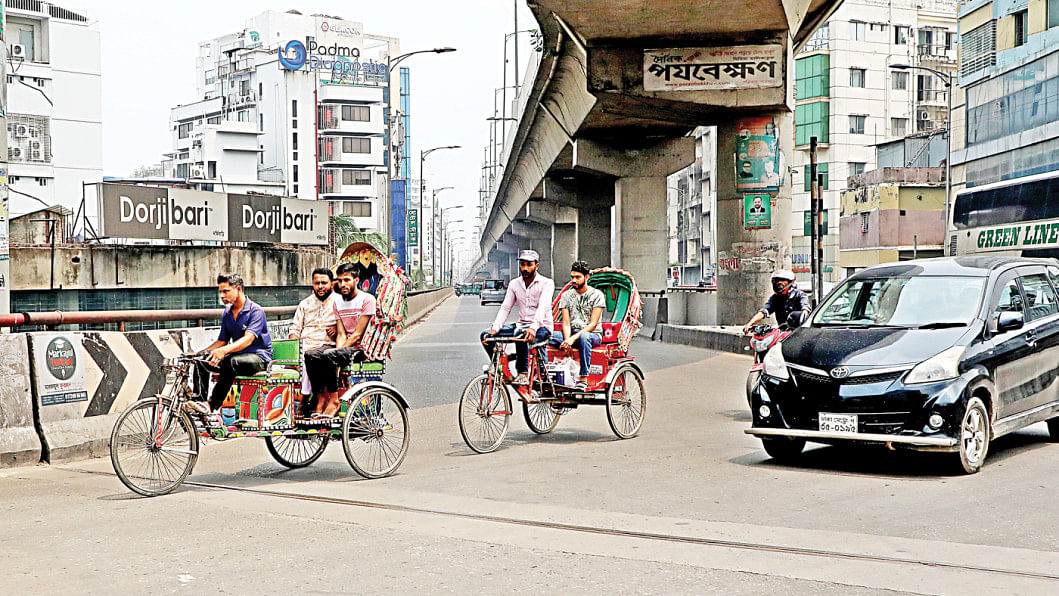
Bangla rickshaw to Batteries
I miss the tinkling sound of cycle bells of the beautiful three-wheeler, the cramped hood space and all. Our humble hand-pulled "Bangla rickshaw", a term I heard for the first time in my rickshaw riding life, is now on the verge of extinction.
"There are few Bangla rickshaws on the road now as opposed to a hundred motorised ones. People who ride rickshaws prefer the faster ones because they think it saves them time," says Abdul Majid, a battery-rickshaw driver.
And he is right, I have hardly seen any old wooden frame ones recently. "The Bangla rickshaw is totally out of production because anything motorised involves speed and it attracts overproduction," says Sohel Anwar, a garage owner.
"Garage and rickshaw owners are now repurposing the frames of old pedal rickshaws to fit the battery and motor. Many are getting the motors and controllers from China and assembling them locally. The physics of this remodel is faulty, making it risky. The traditional lightweight rickshaw frames and braking systems are not designed to control high speed, and they struggle to maintain balance," Anwar confesses, but chooses to ignore it.
"Driving any motorised vehicle needs training because the riders need to learn to control the speed. It is essential for road safety. You cannot throw off your passenger with your hard brake misadventures," says an anonymous doctor, who deals with road mishap emergencies. He added that he gets a minimum of five to eight battery-driven rickshaw accident patients every day.
"I agree that many of us do not follow traffic rules, we are not allowed on main roads, yet we venture that way, we ride as if we are manoeuvring an aeroplane, (we do call ourselves 'pilots', though), if we can control our urges to speed, this motorised rickshaw is a better source of income than the ones pulled by body force," Masjid's friend Hasan says.
The city authorities did permit a few, but with no one to monitor, the production doubled on the sly, resulting in an influx of these battery rickshaws in the streets leading to frequent accidents.
Majid took out a loan and got himself a battery-driven rickshaw for Tk 70,000. "Our hardship has been cut down by three-fourths. We defied the weather to earn a few hundred, not to mention the dehydration, heat strokes, and catching a cold. If ploughing by cows, thrashing grains, and all such hard labour has been replaced by machines, then why not pulling a rickshaw," Masjid debates his point in favour of battery-driven rickshaws.
Meanwhile, the Dhaka Metropolitan Police's traffic department has launched a series of drives against unauthorised battery-powered rickshaws in Dhaka, leading to protests and traffic anarchy.
The drafted policy to legalise the use of battery-powered rickshaws and easy bikes in 2021, is yet to be finalised, but in the meantime, they run illegally, without registration or proper safety checks. A ban was imposed on them in 2023 but had to be withdrawn for the sake of leaving many without a source of income.
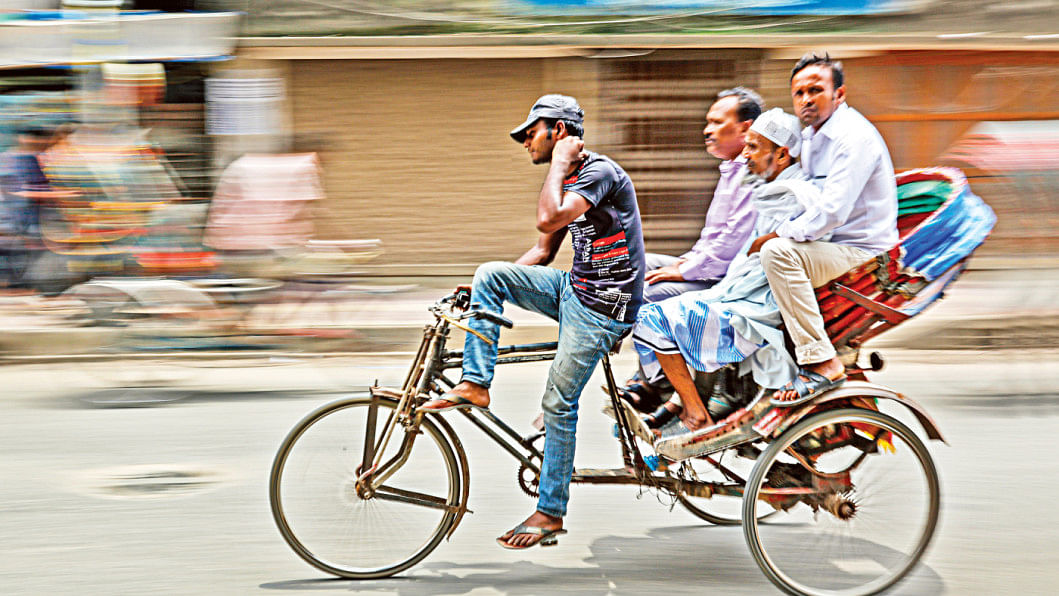
The debate continues
Meanwhile, the debate over the rickshaw continues.
For some, these battery-run vehicles are a time-efficient and cost-effective blessing; for others, they are a dangerous disruption to the already precarious traffic system.
"These battery-run rickshaws are convenient but come with risks. In some lanes, regular rickshaws aren't available, so we've had to rely on battery-powered ones to avoid switching vehicles multiple times during long commutes. While they've made travel easier and more affordable, the risks are undeniable," says Mehedi Hasan, a Mohammadpur resident.
Siraj Ahmed, a Dhaka University student, adds, "Battery-run rickshaws should only be allowed to operate after undergoing thorough technical inspections. Both the rickshaw and the driver must be licensed, and their numbers should be carefully regulated. Without such oversight, these vehicles will continue to pose a threat to road safety and disrupt civic order."
"Sometimes, I prefer the battery-powered ones because they're faster, have more seating space, and get me to my destination quickly," says Kaiser Ahmed, a banker. His colleague, Ridima Huq, takes a different view. "These rickshaws are too dangerous. Have you seen how they drive? It's just an accident waiting to happen," she responds.
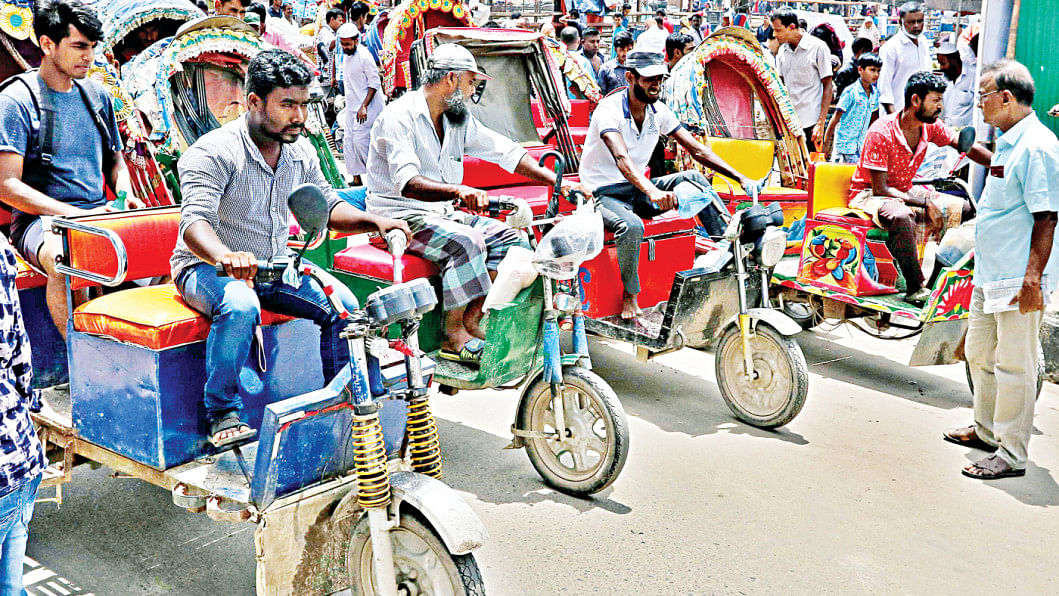
The general opinion of pedal rickshaw lovers
Just because they have a motor they cannot get on flyovers and busy thoroughfares; they are not cars. Unfortunately, this transition was not done thoughtfully so there are almost no votes for Majid and his fellows. And we would like to stay true to our age-old Bangla rickshaw.
The drivers need training to properly control speed and learn to reason with the habit of rough driving.
Coming back to Abdul Bhai's rickshaw days, he too showed off his skills but hard cornering, sudden braking, and running into cars were never done. They knew their weight and their maximum speed. They acted accordingly, even in their heroic antics.
Passengers pressed for time disregard all the risks involved in riding a battery rickshaw. They fail to alert the puller to slow down or maintain traffic ethics. As a result, the passenger and the driver's tag team effort and lack of civic sense leave our traffic system in such doldrums.
Thus, I say let's get our Bangla rickshaws back on track.

 For all latest news, follow The Daily Star's Google News channel.
For all latest news, follow The Daily Star's Google News channel. 

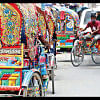
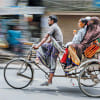
Comments